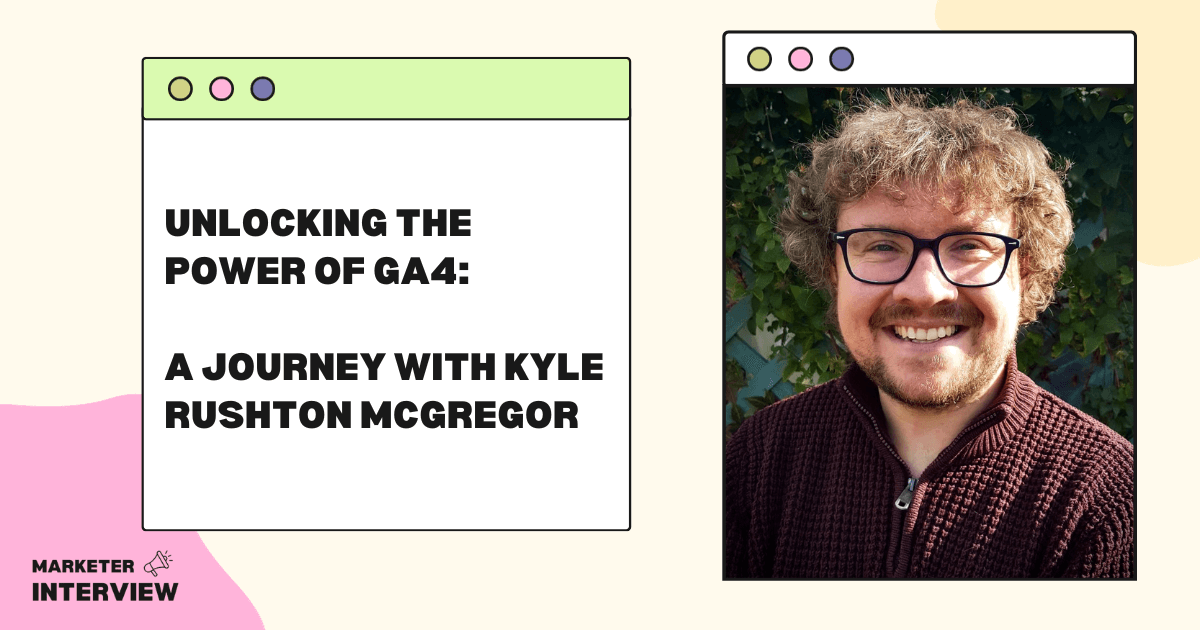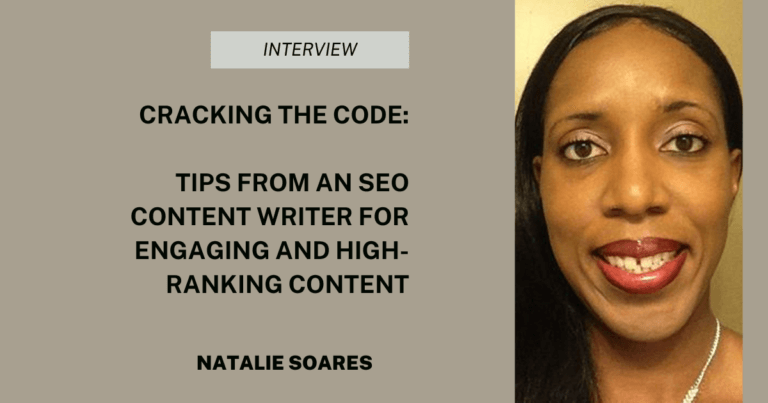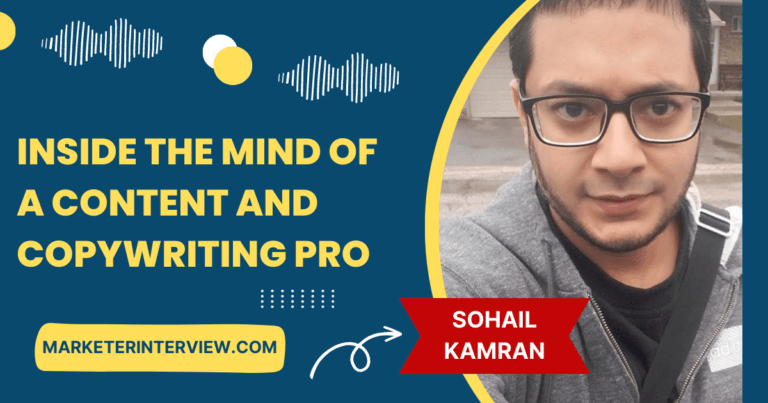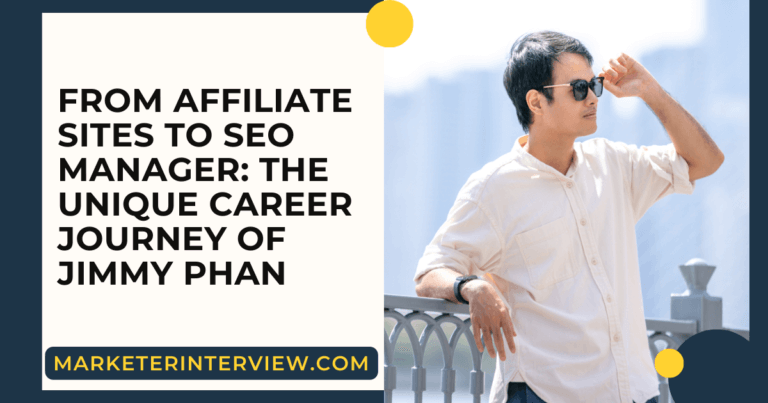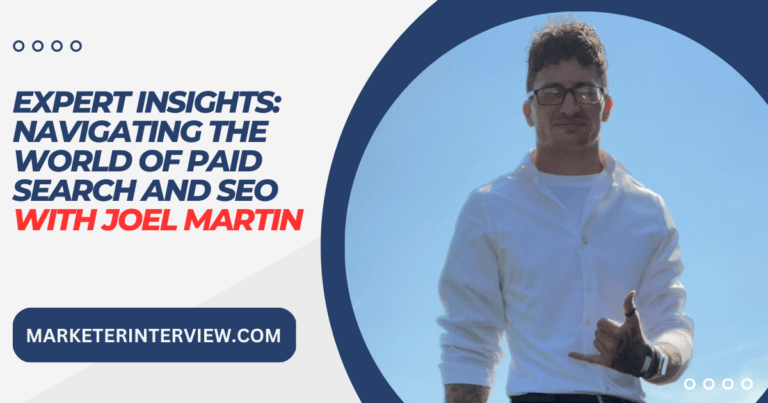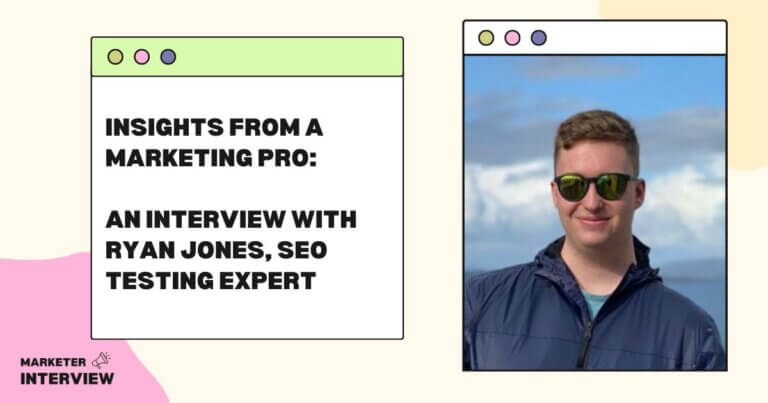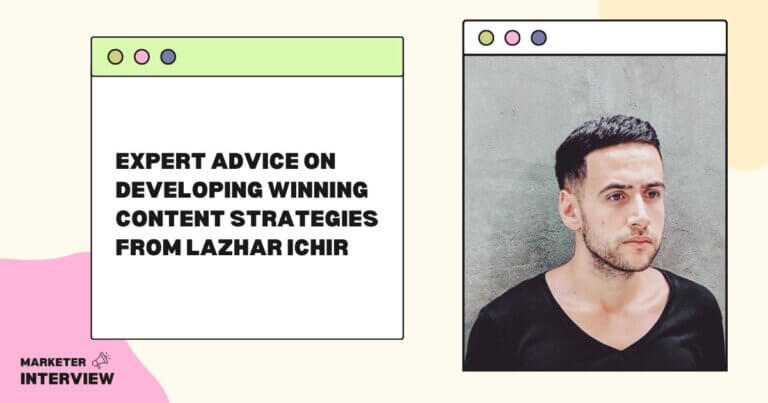Unlocking the Power of GA4: A Journey with Kyle Rushton McGregor
Welcome to Marketer Interview, where we delve into the journeys and expertise of exceptional marketers.
Today, we have the pleasure of speaking with Kyle Rushton McGregor, a Freelance SEO and GA4 Specialist who has made a fascinating transition from SEO to GA4. Kyle’s story is not just about career evolution but also about embracing the freedom of freelancing and relocating to the serene Orkney Islands.
Kyle’s expertise spans various aspects of digital marketing, making him a sought-after professional. His experience in SEO and GA4 brings a unique perspective, and we’re eager to learn from his insights.
Contents
- 1 Kyle, your transition from SEO to GA4 is intriguing. Could you share the pivotal moments that led you to specialize in GA4 and what sets it apart from other analytics tools?
- 2 As a freelance SEO and GA4 specialist, what motivated you to move to the Orkney Islands? How has this change impacted your career and work-life balance?
- 3 You have a rich background in SEO. Could you elaborate on your experiences in keyword research and how they complement your GA4 expertise?
- 4 GA4 migrations can be complex. What advice would you offer to businesses looking to make a seamless transition to GA4, based on your experience?
- 5 In your role as an SEO consultant, what are some challenges you’ve encountered in implementing local SEO strategies, and how have you overcome them?
- 6 You mentioned expertise in YouTube SEO. What are some effective strategies for optimizing content on this platform, and how does it tie into your overall digital marketing approach?
- 7 GA4 auditing is critical for tracking user behavior. Can you share some best practices in auditing GA4 to extract valuable insights for businesses?
- 8 What tools and software are essential in your day-to-day work as an SEO and GA4 specialist, and how do they streamline your processes?
- 9 In digital marketing, what trends or shifts do you see on the horizon, and how do you stay ahead of the curve to benefit your clients?
- 10 Your background includes a Diploma in Digital Marketing. How has this formal education contributed to your career, and what advice do you have for aspiring marketers?
Thanks. The pivotal moment for me was when it became clear that GA4 brought in 90% of my clients. That and I found it easier to sell my GA4 services at a higher rate than my SEO services.
Looking back, in 2020, I remember reading from Google that GA4 would be the default analytics tool (replacing Universal analytics), and I thought, “Oh, I better learn about this.” Little did I know it would take me down the path that it has.
GA4 still has many challenges, not least the steep learning curve for those used to a different tool, but I like the new interface. The path exploration and funnel exploration, in particular, are nice visualizations. Oh, and for most users, it will be free.
As a freelance SEO and GA4 specialist, what motivated you to move to the Orkney Islands? How has this change impacted your career and work-life balance?
For a long, long time, I wanted to move here to be closer to nature and the seasons, and being freelance meant I could do that. What’s great about SEO and GA4 is that you don’t necessarily need to be on the ground, in that room, to make a difference. Using tools like Loom for video reports or Google Meets means you can still communicate well.
I must give a shout-out to the digital agency that I worked for previously, Common Ground because they let me move up here while I was still working for them. Without that, I’m not sure what the path would look like.
I don’t think it has impacted my career at all, to be honest – in many ways, it’s a USP that people like to hear about. The only challenge has been if a client does want to meet or if I’m giving a presentation at a conference. That requires a bit more preparation, time, and money (unfortunately) to get off the island.
In terms of work-life balance, it’s been exciting – I think I’m working more up here than I did down south, and I’m happy with that because I’m starting afresh with freelancing and wanted to grab the opportunity while I can. But do I want to be out on a walk near a coast, watching for Orca whales? Absolutely.
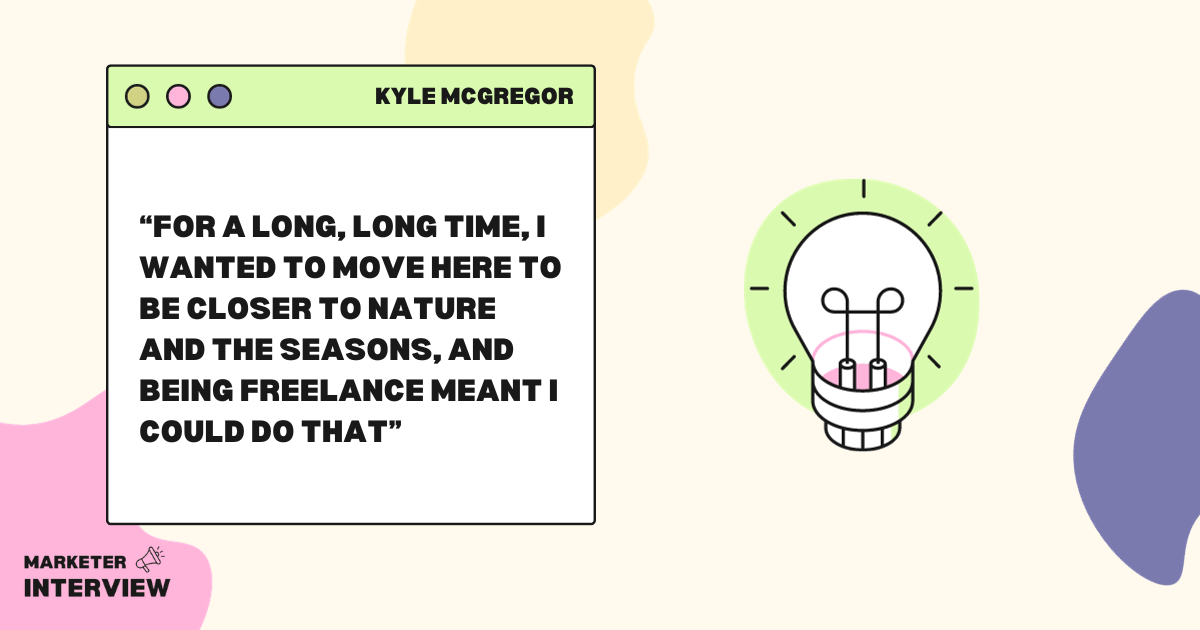
You have a rich background in SEO. Could you elaborate on your experiences in keyword research and how they complement your GA4 expertise?
Sure, a lot of my focus as an SEO has been on keyword research. This could have been a keyword gap analysis to highlight opportunities against competitors or a much larger keyword piece to help determine the sitemap and new pages. I’ve also supported clients with content briefs outlining keywords to use and questions that need answering.
Both keyword research and GA4 are analytical – it’s about peeling that onion and constantly asking the question “why” – why is that keyword a good one to use, why should a user listen to this author, etc?
Having that GA4 expertise helps me to understand the underlying intent, for example, and what that means for the type of page to create.
GA4 migrations can be complex. What advice would you offer to businesses looking to make a seamless transition to GA4, based on your experience?
You’re right – a lot of my projects have come from organizations who think they’ve set up GA4, and it just doesn’t seem to be correct. There’s a few layers to it.
However, there’s an opportunity here when you migrate from Universal Analytics (UA) to GA4, and that’s asking ‘what’s important to track.’
Don’t simply bring over the baggage of all those events you track from UA. Take the time to understand what you want to track, how you will track them – and, crucially, why.
Once you have that in place, work can begin on the implementation.
In your role as an SEO consultant, what are some challenges you’ve encountered in implementing local SEO strategies, and how have you overcome them?
Being in Orkney, I have a few local clients who engage with me for SEO. And I’m sure the challenges are the same here as elsewhere:
- Lack of resource
- Lack of know-how
- Lack of buy-in for strategy
One thing I do before starting to work with someone is to understand where they are with the above areas (resource, know-how, buy-in) and build out a project plan (and pricing) that takes that into account so, if there’s a lack of resource or know-how then putting in a process whereby I can help them with that.
In terms of buy-in, I always ask the question about who needs to sign off things, which often illuminates some areas where I need to work with people who I previously haven’t spoken to. Speaking to them and understanding their concerns from the get-go is essential.
You mentioned expertise in YouTube SEO. What are some effective strategies for optimizing content on this platform, and how does it tie into your overall digital marketing approach?
Well, I can’t say that I enjoy GA4 and analytics without mentioning YouTube analytics, can I?
One significant area is understanding the keywords that drive traffic to that video and then finding opportunities to include those keywords in your title or description (if applicable).
Another area – and it’s so easy to do – is ensuring you’ve got all aspects of your YouTube channel set up correctly. That could be:
- The About section
- Your Tags and Summary Cards
- YouTube Hashtags
- An enticing thumbnail
All of these things will help users and YouTube understand what the video is about
Video is critical to include in your marketing mix, so if there’s scope, include it as part of your strategy. This might mean creating a video version of the blog you’ve written or providing a concise overview of your SaaS product. Users like to digest information in various formats, and you should be welcome to do that.
The first one goes back to what I mentioned about migrations: Understand what you want to track and why
From there, you’ll want to ensure that you’ve got GA4 set up to extract the data you want e.g.:
- The data retention level was set to 14 months rather than 2 months as the standard
- Enabling Google Signals for tracking demographic data
- Cross-domain tracking if you’ve got journeys across different domains
After that, it’s about setting up the reporting in a way that suits you. For example, the Report section of GA4 is entirely customizable. So, I’ve created report sections with information specific to a country. Or replicate some of those UA reports around social media tracking.
One other thing to mention is about ‘Unassigned’ traffic, and part of my audit will look at that and see if the UTMs that are being used are correct. GA4 has relatively strict conditions for channel grouping, so ensuring the UTMs are correct is vital to ensuring correct channel attribution.
What tools and software are essential in your day-to-day work as an SEO and GA4 specialist, and how do they streamline your processes?
I try to keep my tools and software to a minimum as I’m still growing and conscious that I don’t want to spend all my income on tools.
That being said, these tools I use a lot:
- Looker Studio for streamlining monthly reporting
- Screaming Frog for crawls and custom searches (and custom extraction)
- Sitebulb for regular crawls of clients (and sending this data to Google Sheets for Looker Studio reports)
- Ahrefs and AlsoAsked for Keyword Research
All of these help me to reduce the dependency on manual tasks.
I have dabbled in using ChatGPT, but that’s an area I want to get stuck in further.
One thing that has saved me tons of time is getting to know the power of Google Sheets formulas more – I even did a course on it. I’ve had instances where I’ve cut 90% of a task’s time simply because I learned how to use a Google Sheets Formula.
In digital marketing, what trends or shifts do you see on the horizon, and how do you stay ahead of the curve to benefit your clients?
Two things I’m seeing in digital marketing (both analytics-related) are the move to a more privacy-focused environment and the need/asks for BiqQuery from organizations.
Those 2 areas I know are areas for me to learn more about. I’ve set aside time (and money) to get to know them better so that when a client does need that skillset, I’m there and available.
It’s tough to stay ahead of the curve, I find, at times – digital marketing is fast-moving, and when you are already busy, it’s hard to find the time to dedicate to learning. But you’ve certainly got to do it. If anyone has a solution/approach, I’d love to hear it.
One thing I’m always about, though, is honesty – and if I don’t know the answer to something, I won’t make up an answer. I’ll say I don’t know and promise to find the solution.

Your background includes a Diploma in Digital Marketing. How has this formal education contributed to your career, and what advice do you have for aspiring marketers?
I’ll be honest – I’m not entirely sure it hugely has – my career trajectory has been interesting. I started as a store manager for a food store, then went into recruitment consulting and sales. All this before someone said to me, “Kyle, I think you’ll be good at SEO,” they provided me with a mentor to learn and grow. And the rest is history.
The diploma helped me to ground myself in some of the fundamentals of marketing – the theoretical, which I then put into practice. It helped to demonstrate to employers and others that I was helpful and could add value.
My advice to aspiring marketers would be never to be afraid to say you don’t know something. Always be curious and know the data.
